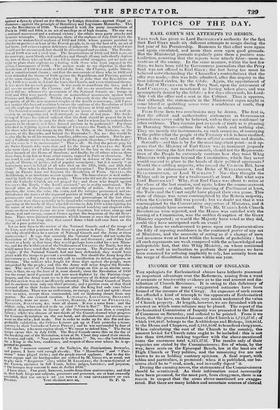TOPICS OF THE DAY.
EARL GREYS SIX ATTEMPTS TO RESIGN.
TH is week has given us Lord BROUGHAM'S authority for the fact that Earl GREY made six different attempts to resign during the
last year of' his Premiership. Rumours to that effect were again
and again circulated, and more than once upon good grounds. But the Ministerial journals regularly gave them a positive con-
tradiction, asserting that the reports mere utterly false—mere in-
ventions of the enemy. In the same manner, within the last few days, we have been told by Government journalists that the Privy Seal was not offered to Earl GREY; the fact being (as must be believed notwithstanding the Chancellor's contradiction) that the oiler was made,—this was fully admitted, after due inquiry in the hest-informed circles, by the Globe. Again, the appointment of the Earl of MusonAve to the Privy Seal, upon the retirement of Lord CARLISLE, was mentioned as having taken place, and was peremptorily denied by the Globe: a few days afterwards, his Lord- ship took the office and a seat in the Cabinet. Thus it appears, that although the statements in the Ministerial organ might in some literal or quibbling sense wear a semblance of truth, they were false in substance.
From these facts two conclusions may he drawn. The first is, that the official and authoritative statements in Government journals Can never safely be believed, unless they are confirmed by other evidence. They contain just as much of truth as is pleasing in Downing. Street—seldom the whole truth and nothing else. They are merely the instruments, on such occasions, of conveying to the public what the people at. the Treasury wish to have credited. That is the only real value of these official assertions and denials.
Secondly—and this is by far the most important point—as it ap- pears that the Ministry of Earl GREY was in imminent jeopardy six times during the last twelvemonth, should not the Representa- tives of the People be extremely cautious how they trust Whig Ministers with powers beyond the Constitution, which they never would consent to place in the hands of their political opponents? Would the confiding majority, who passed the Coercion Bill, have intrusted its enforcement to the Duke of WELLINGTON, Lord ELLENBOROUGH, or Lord Wicissow ? No—they thought the Whigs sails in power for a twelvemonth at least. But what says Lord BeouGsessi ? Why, that Earl GREY was about to retire at the close of the last session, and again before the commencement of the present : so that, until the meeting of Parliament at least, the Toriesand the Court might have played their own game. This state of things was never contemplated by the Reform majority, when the Coercion Bill was passed; but we doubt not that it was contemplated by the Conservative supporters of Ministers, and it might certainly have occurred. When Mr. WARD's Irish Church Resolutions were rejected, and the house was satisfied with the issuing of a Commission, was the sudden disruption of the GREY Ministry expected; or would the Majority have voted as they did, could they have anticipated such an event ?
Often have we endeavoured to press upon our Representatives the folly of reposing confidence in the continued power of any set of Ministers, and the necessity of acting as if a change of men and measures were at least within the bounds of probability : but all such arguments are weak compared with the acknowledged and indisputable fact, that this Whig Ministry, on whose continued. power as well as inclination to perform their promises we have been censured for refusing implicitly to rely, has actually been on the verge of dissolution six times within one year.




















 Previous page
Previous page